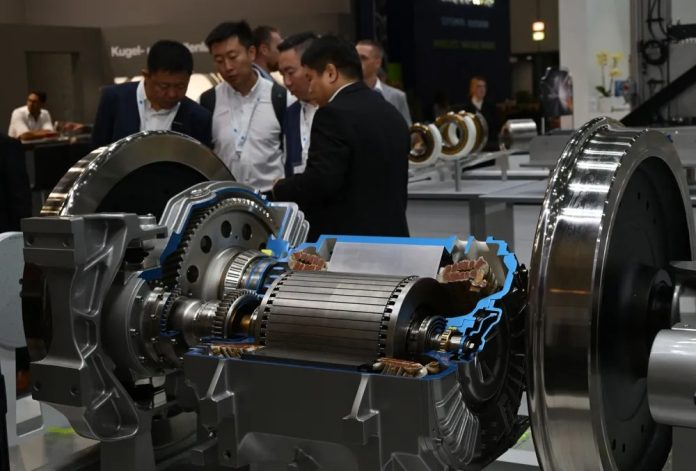How times have changed. A few years ago, Germany avoided any mention of the economy in relation to geopolitics. Now the country, which relies heavily on raw materials from China, has created a raw materials fund that will help German companies process and recycle raw materials. It promises to make German industry less vulnerable to supply chain disruptions, especially from hostile states, and could even do its part for the environment.
Like most modern economies, Germany relies on imports of rare metals, and that means a lot of imports from China. Between January and November 2022, around 66 percent of Germany’s rare earth imports came from China, Germany’s Federal Statistical Office reported. In the case of the frequently used rare earth elements lanthanum, neodymium, praseodymium and samarium, 75 percent of German imports came from China, and in the case of scandium and yttrium the figure reached almost 95 percent. ‘We are more dependent on rare earths from China than ever on Russian gas,’ said Matthias Wachter, head of defence, space and raw materials at the Federation of German Industry (BDI).
In the globalized world built over the last few decades, those imports were not a big deal.
It was quite the opposite; They were a matter of emotion. If one country lacked a natural resource or product, another filled the gap and everyone benefited. Efficiency and specialization were the name of the game.
But when COVID-19 hit, German and other Western industries became uncomfortable with such dependencies. So did policymakers and ordinary citizens, who lived through the disastrous effects of their countries’ dependence on personal protective equipment produced in China.
‘If we do not obtain these raw materials from China, German industry and, by extension, the German economy, would be seriously harmed,’ Wachter said. ‘And it is also a matter of national security.’ The F35 aircraft, for example, “requires more than 900 pounds of rare earth elements,” the US Department of Defense reported. “Each Arleigh Burke DDG-51 destroyer requires 5,200 pounds, and a Virginia-class submarine requires 9,200 pounds,” and rare earth elements are also used in “Tomahawk missiles, a variety of radar systems, Predator unmanned aerial vehicles, and the Joint Direct Attack Smart Bomb Munitions Series.”
Sweden already knows what it’s like to run out of raw materials processed in China: since 2020, China has been blocking exports of graphite, a crucial component of electric vehicle batteries, to Sweden. About 75 percent of the world’s graphite is currently mined in China.
The bottom line, Wachter said, is that “we have to reduce our dependence on China. But the industry cannot do it alone.” By launching the commodities fund, which has a volume of 1 billion euros (approximately $1.1 billion), the German government appears to agree. Like other Western countries, Germany possesses rare earths. In 2080, for example, geologists reported discovering pockets of indium, gallium, and cobalt in the Harz Mountains. But since processing rare earths is expensive and people don’t want those kinds of processing plants in their backyards, it has been convenient to let China provide the metals.
The new fund will be managed by KfW, a state-owned investment and development bank.
The KfW was created in 1948 to manage Marshall Plan money in Germany and has since grown into an ingenious organization that takes on structural tasks on behalf of the German government and finances projects in developing economies. In 2018, for example, Merkel’s government rejected an offer from China’s State Grid for a 20 percent stake in energy company 50 Hertz by ordering KfW to buy it.
The euros will be provided to companies through loans and equity investments. ‘By participating in domestic and foreign projects, from mining to processing and recycling, we are taking a step that other countries have already taken successfully,’ said Franziska Brantner, member of the Green Party in the Bundestag and state secretary of the Federal Ministry. of Foreign Affairs. Economic Affairs and Climate Action, he said in a statement.
German industry is delighted. ‘China sets prices so low that Western initiatives are typically not competitive,’ Wachter said. ‘The fund will help companies get started, but the risk remains with the companies, as should be the case in a market economy.’
To be sure, €1 billion is modest compared to what Beijing can make available to raw minerals companies in China and beyond. When it comes to rare earths, China has the largest known reserves, followed by Vietnam, Russia, Brazil, India, Australia, Tanzania, the United States and Greenland. Last year, S&P Global noted: Although many countries are increasingly aware of the importance of these minerals, Chinese companies have been the most active in these efforts.
The emerging markets of Africa and Latin America are your next stops. …Heeding calls from the industry, the Chinese government is likely to adopt more supportive measures as it views these sectors as an integral part of the country’s core strategy. This alignment of interests will facilitate the development of China’s influence over these minerals and the industries that depend on them as more Chinese companies gain access and expand their production capacity. The fund will also not be able to change the fact that Germany has mineral resources. relatively limited rare earths. ‘It is clear that Germany is not in a position to become self-sufficient in rare earths and we will continue to need imports,’ Wachter said. ‘But we can encourage the processing of smaller quantities here at home.’
What’s more, like other Western countries, Germany has a large number of batteries and devices containing rare earths that can be recycled, which is part of what the fund will incentivize.
The conclusion of German politicians and industry that dependence on China for raw materials is risky indicates a change much more significant than the much heralded military Zeitenwende, a historic turning point. Although some industrial giants, particularly the country’s automakers, still seem to believe in globalization as usual, and most especially in business as usual in China, many other companies have come to the conclusion that the good old days of trade borderless and specialized countries are over. German industry demonstrated this on September 13, when the German navy ship Baden-Württemberg sailed through the Taiwan Strait. The Baden-Württemberg was en route from Incheon in South Korea to Manila in the Philippines, and as Boris Pistorius, Germany’s defense minister, explained, “international waters are international waters. It is the shortest route, it is the safest route given the weather conditions and it is international waters, so we are going to pass.” Although sailing through the free waters of the strait should not be perceived as a provocation, Beijing usually chooses to see it that way. In years past, fear of offending Beijing would have deterred German defense ministers from having their ships cross the strait. This time too, Beijing warned Berlin that any such trip would be a bad idea. But, backed by Pistorius, the Baden-Württemberg managed to overcome it. What’s more, the ship’s passage had the support of German industry.
‘German industry supports the federal government in its efforts to maintain the already eroded international rules-based order,’ BDI chief executive Wolfgang Niedermark told German newspaper Handelsblatt, adding that rules only work if they are applied consistently. and without exception. ‘Germany must also take responsibility for this,’ he said. Times have definitely changed. However, what has not changed is the acceleration of the climate crisis. If Germany’s new raw materials fund succeeds in helping German industry reduce its dependence on China, it will have done its job. And if it can accelerate the recycling of raw materials (which means that less CO2 will be emitted into the atmosphere during the extraction of raw materials), it will be undeniable that everyone will win.
Source: https://foreignpolicy.com/2024/10/10/germany-china-supply-chains-de-risking-globalization/?mod=djemlogistics_h





